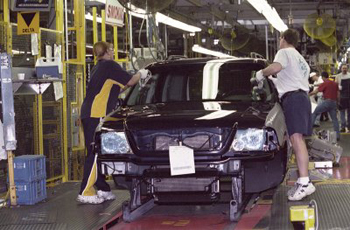 |
| Courtesy: Ford Motor Company |
“Nothing is more important to us. Nothing." Those were the words from General Motors chief finance executive John Devine to a packed crowd of auto industry insiders in a forum at Traverse City. The topic of question: healthcare. More to the point, the ever rising costs of healthcare and the possibility of it impeding on domestic carmakers and their ability to compete.
To get an idea of how big this challenge is, take the words from Ernst & Young’s Mark Finucane. According to him, GM and the other domestic automakers spend about $1,400 per vehicle on healthcare costs. The steel used during construction, on average, only costs GM $700 per vehicle. With competition ever fierce and consumers expecting thousands of dollars of rebates on American-brand cars, $1,400 is a very big deal. In fact, it is estimated that the Big 3 spend almost $10 billion dollars a year on healthcare for almost 2 million employees, retirees and their dependants. That number is increasing upwards of 12% every year.
“For those of us that have to pay these bills, it's clearly a huge burden," noted Devine "For us, compared to some of our competitors, it's like trying to run around carrying 50-pound bags."
It’s an issue that is having an impact on just about every company in the country, especially on automakers that employ vast amounts of workers at their numerous unionized plants across the country. As the “boomer generation” retires, automakers are often contractually obligated to continue to pay for their healthcare even after they’ve stopped working. Add the rise in of costs of prescription drugs and doctors visits for all employees - current and former, and the issue becomes even more pressing. Then remember that foreign-based automakers don’t yet have a large amount of retired workers in this country to take care of. Often, these companies are also based in countries with some form of nationalized healthcare that removes the direct financial burden of workers in their domestic plants. With all of this, it becomes easy to see why American car companies are concerned. With this being an election year, the number of executives worrying aloud should only increase.
 |
| Courtesy: Ford Motor Company |
Some in the industry are beginning to contemplate the idea of a nationalized system of healthcare. The Detroit Free Press reports that Larry Denton, CEO of auto supplier Dura Automotive Systems, Inc. thinks the time may have come for the government to step in. “I spent a lot of time in Canada, and I used to think their health-care plan was a bad idea. Now after being back here I'm not so sure. We're about the only modernized country not doing it and the companies here pay a 30-percent penalty because the rules are different.”
"All of us in the industry have a mutual interest in getting this taken care of," Jim Padilla, COO of Ford Motor Company, told the crowd. "It's getting to the point where it's unaffordable for all of us to provide health care."
"Nearly everyone is unhappy with the health-care system, including the doctors, nurses and patients that use it. The problem is it's so disorganized that changing it is a nightmare," said Finucane. There seems to be a consensus amongst the Big 3 that something needs to be done, but just what that is exactly, remains to be seen.

 AF Project Vehicle | Corporate
AF Project Vehicle | Corporate



 AF Project Vehicle | Corporate
AF Project Vehicle | Corporate

